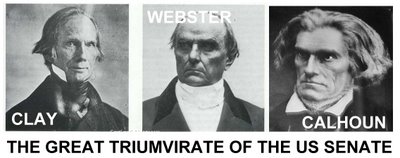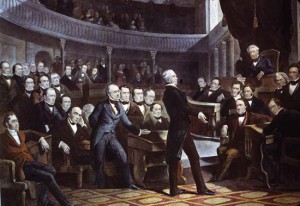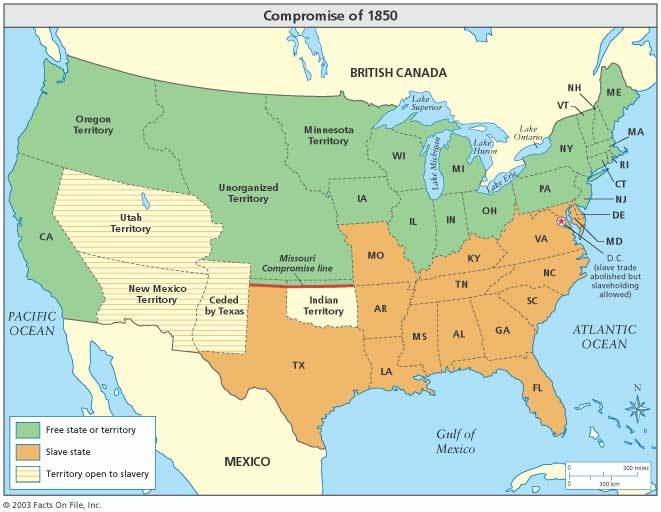 Henry Clay (The Great Pacificator)
Henry Clay (The Great Pacificator)
- ability to work out difficult compromises
- in his seventies and sick
- proposed compromise that called for North and South to give and take
o Congress admit California as a free state
o Enact a stricter Fugitive Slave Law
o Popular Sovereignty would decide slavery issue in Utah and New Mexico
o Slave trade only would end in Washington DC
o Texas paid $10 million for New Mexico
John C. Calhoun
- also old and sick…had to have someone else read his speech regarding Clay’s compromise plan
- believed a final solution to the slave issue was needed or disunion was inevitable
- did NOT think Clay’s plan gave enough protection to the South
- If the North did not agree to the demands of the South, they would secede – break away from the Union
Daniel Webster
- also old and sick…
- tried to bring North and South together in unity
- urged Senate to accept the Clay compromise
- did not think cotton or tobacco would grow in California anyway
- popular sovereignty would protect South but not necessarily spread slavery to the west
- 3 hour speech
- Many abolitionists did not feel it was strong enough
- Persuaded many to support compromise
Many compromises to protect the unity of the nation over the years
- Northwest Ordinance of 1787
- Missouri Compromise of 1820
- Now…Compromise of 1850
Compromise of 1850
o Northern radicals argued the morality of slavery was more important than unity
o Southern radicals organized boycotts of northern goods- some promoted secession
o Sometimes violent
- Henry Foote of Mississippi aimed gun at Thomas Hart Benton of Missouri over it
- Stephen Douglas of Illinois took charge of getting it passed
o Got each measure through Congress separately
- Calhoun and President Taylor had died by September 1850
- New President Millard Fillmore favored the Compromise
- FINALLY passes
 New Fugitive Slave Act of 1850
New Fugitive Slave Act of 1850
- amended the earlier law with strict provisions
- required private citizens to assist with apprehending runaway slaves
- citizens helping fugitive slaves could be fined or put in prison
- angered the North
- were forced to support the slave system
- many captured “fugitives” were actually free blacks kidnapped and sold into slavery
o could appeal to judges for release
- judges earned more money if they found in favor of the slave owner
- North resented increased federal intervention in the affairs of states
o Some states passed Personal Liberty Laws
Nullified Fugitive Slave Act and allowed state to arrest slave catchers for kidnapping

